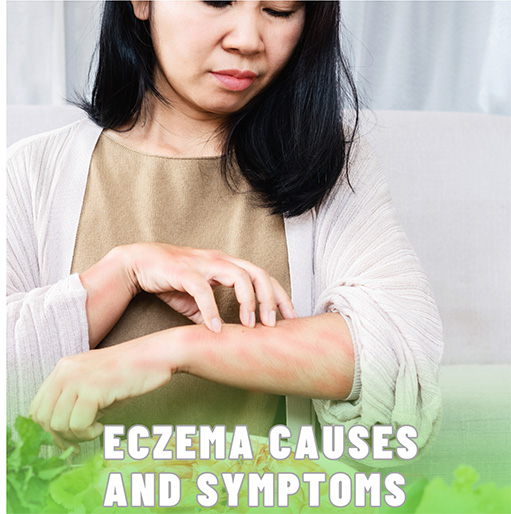Eczema and Dry or Sensitive Skin
Eczema, or dermatitis, is a chronic skin condition affecting millions worldwide. It is characterized by itchy, inflamed, and red patches on the skin, often accompanied by dryness, scaling, and sometimes oozing. In this blog post, we will delve into the causes and symptoms of eczema, shedding light on this common condition to help you better understand it.

Genetic Factors:
Genetic factors play a significant role in creating eczema. Studies have found that people with a family history of eczema are more likely to develop the disease. Specific genes that regulate the skin's barrier function and immune response are identified as contributing factors. Mutations or variations in these genes can impair the skin's ability to retain moisture, making it more sensitive to irritants and allergens. These genetic variations can also lead to an excessive immune response, triggering inflammation and the characteristic symptoms of eczema. Immune System Dysfunction: Immune system dysfunction is a key factor in the development of eczema. Individuals with eczema have an immune system that is oversensitive to various triggers, including irritants and allergens. Normally, the immune system helps protect the body from harmful substances. Still, in people with eczema, it becomes hyper-responsive, triggering an inflammatory response even to generally harmless substances. This excessive immune response leads to inflammation in the skin, resulting in the characteristic symptoms of eczema, such as redness, itching, and swelling. The immune system dysfunction can also affect the skin's natural barrier function, make it more susceptible to environmental irritants and allergens, further exacerbating the condition.
Environmental Triggers:
Environmental triggers are crucial in triggering or exacerbating eczema symptoms. Irritants such as harsh soaps, detergents, and chemicals can strip away the skin's natural oils, leading to dryness and irritation. Allergens, including pollen, pet dander, and dust mites, can stimulate an immune response in individuals with eczema, resulting in inflammation and itching. Additionally, certain foods, such as dairy products, eggs, nuts, and wheat, may act as triggers for some individuals, leading to eczema flare-ups. Climate conditions also have an impact, as dry or cold weather can rob the skin of moisture, causing it to become dry and more prone to irritation. Similarly, excessive heat and sweating can exacerbate eczema symptoms. Identifying and avoiding these environmental triggers can help individuals with eczema manage their condition more effectively and reduce the frequency and severity of flare-ups.
Skin Barrier Defects:
In individuals with eczema, there is often a compromised skin barrier, which plays a significant role in the development and progression of the condition. The outermost layer of the skin, known as the stratum corneum, acts as a protective barrier, preventing moisture loss and shielding the skin from external irritants and allergens. However, in people with eczema, this barrier is weakened or impaired. As a result, the skin becomes more susceptible to environmental triggers, such as harsh soaps, detergents, and chemicals, which can easily penetrate the skin and cause irritation. Additionally, allergens, such as pollen, pet dander, and dust mites, can breach the compromised skin barrier and trigger an immune response. The compromised barrier also leads to increased water loss from the skin, resulting in dryness, further exacerbating eczema symptoms. Maintaining and strengthening the skin barrier through proper skincare routines, including gentle cleansing and moisturization, is crucial to managing eczema and reducing flare-ups.

Symptoms of Eczema
Intense Itching: Intense itching is a symptom of eczema and is often the most distressing for individuals affected. Scratching disrupts the skin barrier, allowing bacteria and microorganisms to enter, increasing the risk of skin infections. The continuous cycle of itching and scratching can create a vicious cycle, as scratching further triggers the release of inflammatory chemicals, leading to more itching. This itch-scratch cycle can significantly impact the quality of life for individuals with eczema, affecting sleep, concentration, and overall well-being. Effective management of eczema involves addressing the underlying causes and inflammation and finding ways to minimize itching and prevent scratching. This may include using topical corticosteroids, antihistamines, and emollient moisturizers and sometimes immune-modulating methods are needed. Finally, implementing strategies to reduce triggers and promote skin health such as beginning an anti-inflammatory diet and regular exercise and yoga regimen.

Symptoms of Eczema
Dry, Red, and Inflamed Skin: Eczema often manifests as dry, red, and inflamed patches of skin. The affected skin may appear rough and scaly, and can feel rough to the touch. The dryness is due to the impaired skin barrier, which fails to retain moisture effectively. As a result, the skin becomes dehydrated, leading to a dry and rough texture. The redness and inflammation result from the immune system's response to triggers and irritants. The blood vessels in the affected area dilate, causing the skin to appear red and giving rise to inflammation. Small raised bumps, known as papules, may sometimes develop within the affected areas. These patches can occur anywhere on the body, but certain areas, such as the face, neck, hands, elbows, and the back of the knees, are more commonly affected. It's important to note that the severity and extent of these symptoms can vary from person to person and fluctuate over time. Proper skincare, moisturization, and avoiding triggers are essential in managing the dryness, redness, and inflammation associated with eczema.
Symptoms of Eczema:
Oozing and Crusting: In certain instances, eczema lesions can progress to a more severe stage where they may ooze clear fluid and develop crusts. This typically occurs when the affected areas are excessively scratched, compromising the skin's integrity. Continuous scratching can cause the skin to break, releasing fluid from the inflamed and irritated skin. The oozing fluid consists of serum, a clear liquid that seeps from damaged blood vessels. As the fluid dries up, it can form crusts or scabs over the affected areas. Oozing and crusting contribute to physical discomfort and increase the risk of secondary infections. The broken skin provides an entry point for bacteria or other microorganisms, leading to disease and further exacerbating the symptoms of eczema. Therefore, avoiding excessive scratching and practicing proper wound care is crucial to prevent complications and promote healing. If oozing and crusting occur, seeking medical attention is recommended to address any potential infections and receive appropriate treatment.

Symptoms of Eczema:
Skin Discoloration: Prolonged eczema flare-ups can lead to skin discoloration, which can cause additional concern for individuals dealing with eczema. The persistent inflammation and irritation can disrupt the normal production and distribution of melanin, the pigment responsible for skin color. As a result, the affected skin may appear lighter or darker than the surrounding areas. In some cases, the skin may develop hypopigmentation, which causes the affected patches to become lighter in color. This occurs when the cells responsible for producing melanin, called melanocytes, are damaged or reduced in number. On the other hand, hyperpigmentation may occur, causing the affected areas to become darker than the surrounding skin. Hyperpigmentation results from an increase in melanin production as a response to inflammation. Skin discoloration can be a cosmetic concern for individuals with eczema, as it may affect their self-esteem and body image. While the discoloration itself may not pose any health risks, addressing and managing the underlying eczema flare-ups can help minimize the chances of skin discoloration and promote overall skin healing. It is advisable to consult with a dermatologist for appropriate guidance and treatment options if skin discoloration becomes a significant concern.
Conclusion:
Conclusion: Eczema is a chronic condition that can significantly impact a person's quality of life. While the exact causes of eczema remain complex and multifactorial, genetic factors, immune system dysfunction, environmental triggers, and skin barrier defects all contribute to its development. Recognizing the symptoms, understanding the triggers, and adopting appropriate management strategies can help individuals control their eczema and minimize flare-ups. If you or someone you know is affected by eczema, it is advisable to consult with a healthcare professional for a proper diagnosis and personalized treatment plan.

